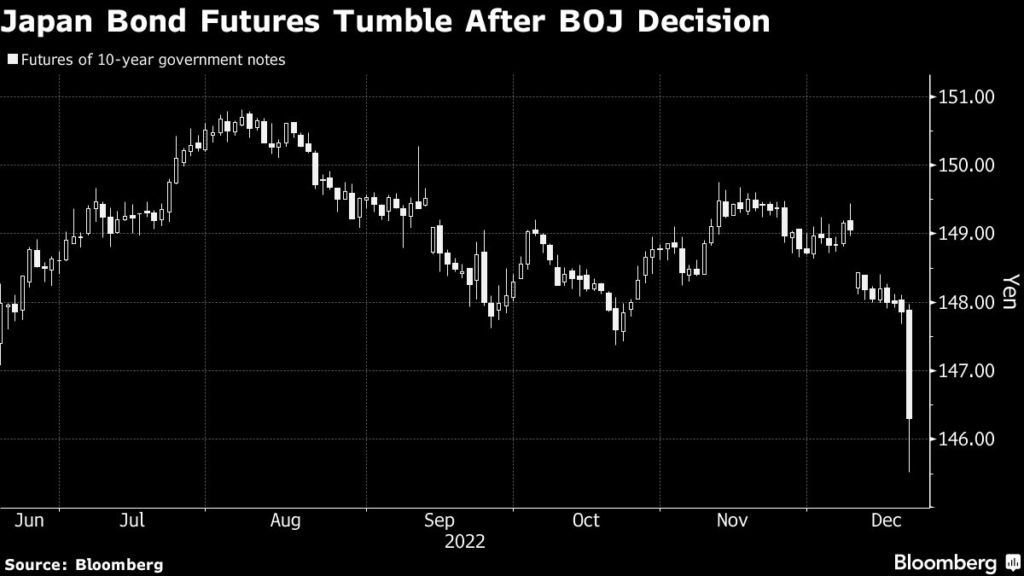The Bank of Japan’s policy move has roiled global markets, but a gaggle of funds stand to benefit — including UBS Asset Management, Schroders Plc and BlueBay Asset Management.
(Bloomberg) — The Bank of Japan’s policy move has roiled global markets, but a gaggle of funds stand to benefit — including UBS Asset Management, Schroders Plc and BlueBay Asset Management.
The money managers are among those that correctly bet Japan’s central bank would relax its long-held cap on bond yields. The BOJ widened the trading band to 0.5% from 0.25% on Tuesday.
“We had kept faith in the widowmaker, so we’re short 10-year Japanese government bonds going into today,” Tom Nash, portfolio manager at UBS in Sydney, said of the trade that involved betting against the BOJ’s policy stance. The central bank’s decision to allow benchmark yields to rise was “a nice Christmas present for us.”
Global funds had long expected the BOJ to eventually cave to pressure to alter its policy stance, but few investors had predicted the timing of the adjustment. As traders ponder the long-term consequences of the shift, some are already lining up wagers for a potential further move by Japan’s central bank.
Mark Dowding, BlueBay Asset Management’s chief investment officer, expects the BOJ to push its upper window for yields to 75 basis points by the end of March as yields continue to rise.
“There will be more to come,” he said, doubling down on the firm’s short rates position Tuesday on Bloomberg Television. “The risk-reward is still very much skewed toward higher yields — rather than lower yields — in Japan.”
The trade was echoed by BlackRock Inc., which is keeping an underweight on duration in Japan within its flagship global unconstrained bond fund. Neuberger Berman is also keeping its short stance on Japanese government bonds in anticipation of further policy adjustments, according to portfolio manager Fredrik Repton.
Speculation has been growing that BOJ would have to let yields rise in tandem with developed-market peers to prop up the yen, which fell to a three-decade low in October. The move by the world’s last major uber-dovish central bank may also mark the end of the global era of rock-bottom interest rates.
“BoJ has to catch up with the rest of the major central banks as inflationary pressures will be high relative to history,” said Repton.
Other Winners
Shorting JGBs — a trade that’s saddled investors from London to New York with staggering losses over the past two decades — has also proved profitable for Kellie Wood.
“I had to stay patient, but I knew it would come,” Wood, a money manager at Schroders which oversees about $940 billion, said of the policy tweak. “The market will now pressure the BOJ. We are adding to our short position and building our position in yen — this has more legs and we are on it.”
Equity investors such as Vikas Pershad from M&G Investments are also benefiting from the shift.
In anticipation of the BOJ’s revision, Pershad had sold off Japanese exporters in favor of banks and insurers this month. The move proved prescient, with companies like Mitsubishi UFJ Financial Group Inc. and Sumitomo Mitsui Financial Group Inc. surging past four-year highs in Asia on Tuesday.
“This is something we have had on our list of potential surprises for 2023 when we were speaking to clients, and it was a high probability one but this timing is surprising — which it was meant to be,” said Pershad, who helps oversee $14 billion.
Orbis Investment Management’s Japan President Tsukasa Tokikuni said the firm has been “aggressively investing” in financials such as Sumitomo Mitsui Trust Holdings Inc. “We’ve been waiting for this moment.”
Risky Bets
Among the losers, yen bears stand to face steep losses, especially if billions of dollars in capital comes flooding back to Japan.
“Shorting the yen is like eating fugu at the finest sushi restaurant,” said Calvin Yeoh, portfolio manager at hedge fund Blue Edge Advisors Pte, whose systematic macro funds covered some short yen positions days before the BOJ announcement. “It’s mostly a zen, pleasant experience — but every now and then, it’s toxic asphyxiation.”
At a briefing on Tuesday, Governor Haruhiko Kuroda stressed the adjustment was not a rate hike and did not signal an exit from the BOJ’s yield curve control policy.
But some — such as UBS’s Nash — say the central bank may be laying the groundwork for a further move.
“It feels more like an interim move than the end of the story,” said Nash. “We will end the year with inflation near 4% and the mood music on this being temporary has clearly changed in Japan.”
–With assistance from Libby Cherry, Marcus Wong, Winnie Hsu, Mark Cudmore, Dani Burger and Jiyeun Lee.
(Adds BlueBay CIO, BlackRock, Neuberger from fifth paragraph.)
More stories like this are available on bloomberg.com
©2022 Bloomberg L.P.










